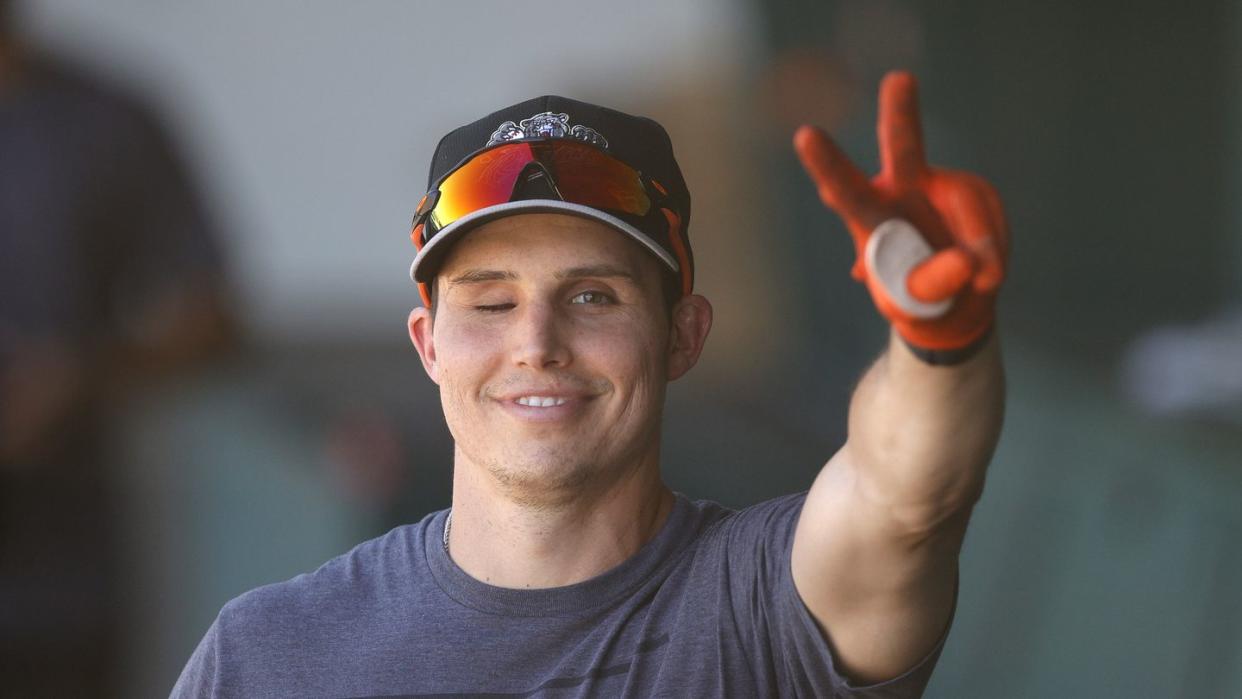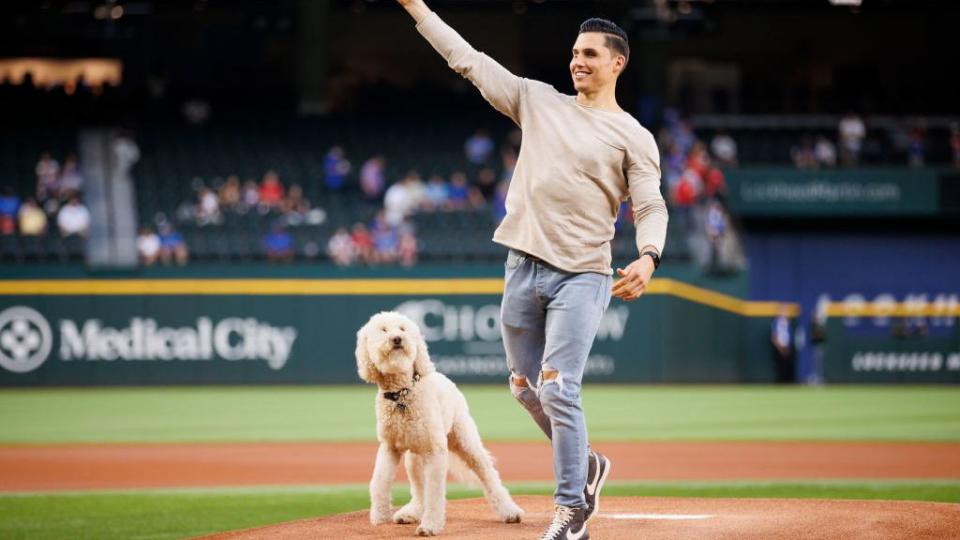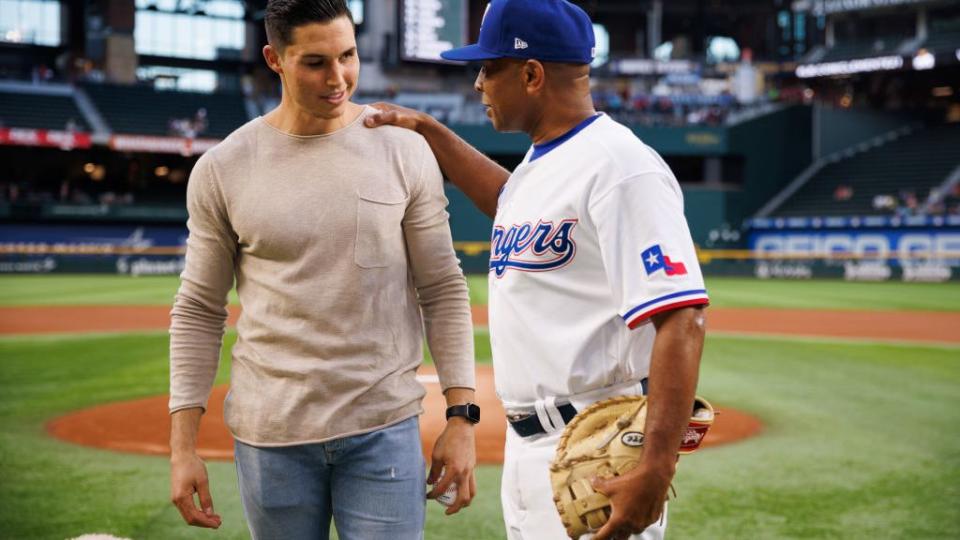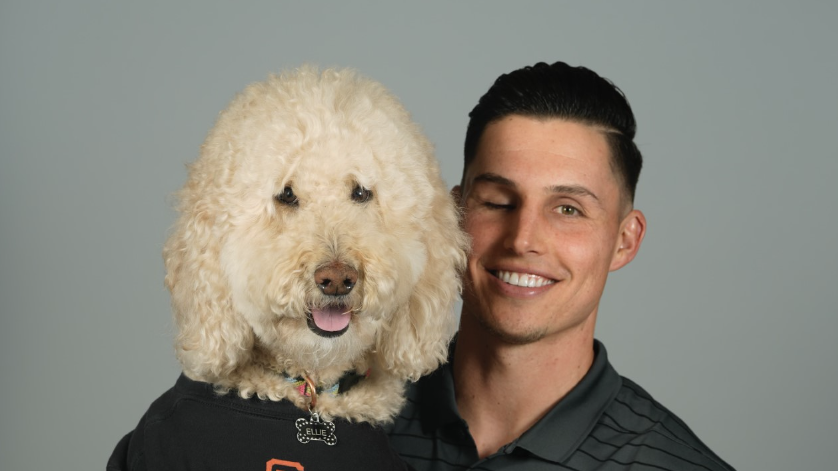Drew Robinson Knows That We Need to Talk About It

- Oops!Something went wrong.Please try again later.
"Hearst Magazines and Yahoo may earn commission or revenue on some items through these links."
Earlier this month, former MLB player Drew Robinson attended a minor-league game in Sacramento—home of the River Cats, the Giants' Triple-AAA affiliate—where he tossed the first pitch to his support dog, Ellie. That night, the players wore wristbands reading “988,” the number of the Suicide and Crisis Lifeline.
It was a full-circle moment for the 31-year-old. In May 2021, Robinson took this field as a player for the River Cats, and hit his first home run since losing his right eye from a self-inflicted gunshot wound in an attempted suicide just one year prior. Rounding the bases again was mythical, but by July, he retired from baseball and joined the Giants’ front office in a mental health advocacy role. He’d realized his truth traveled further than any home run he’d ever hit.
Thousands of miles away, I was impacted by Robinson’s story via E60: Alive: The Drew Robinson Story from ESPN’s Jeff Passan. I attempted suicide on August 22, 2013 for some of the same core wounds—catastrophizing, depression, self-hatred, obsessive spirals, and perfectionism. I even caught myself comparing my attempt to Robinson's. Was I a fraud to call myself a suicide attempt survivor when I hadn’t suffered as gruesomely as he did? Robinson had told the police who responded to his Las Vegas home that he shot himself because, “I hate myself.” I couldn’t quantify how many times I’d thought the same thing, and still do sometimes.
That’s the thing about navigating post-attempt life. The residual scars complicate separating who you are from what you did. So, I asked Jeff if he thought Drew might be interested in connecting. I wanted to talk with someone who gets it—with whom I could say all of the things we feel we aren’t supposed to say out loud. Turns out, Drew did too.
This conversation has been edited for length and clarity.

ESQUIRE: After my attempt, my therapist told me there’s a difference between not wanting to live at all and not wanting to live this way anymore. What do you do differently post-attempt?
DREW ROBINSON: I go through episodes. They’re usually intense and last for many days, weeks, and months. But the concept of understanding now that I don’t want my life to end, I just want this part of my life to end—this feeling to heal—helped me get through my latest depressive and suicidal episode that I had in February of this year. The actionable things I do are committing to weekly therapy, daily habits that I find value in, mixed with addressing, processing, talking, and accepting. I have the awareness now of what is a sign of something from the past versus what is a sign of something for the future.
August 22 marked 10 years since my attempt. August is a confusing month for me because my birthday is August 12, but it's forever the month where I almost made sure I never had another birthday. Your attempt date is April 16—and your birthday is April 20. How do you experience every April now?
It's a very similar feeling. The last couple of years, I've kind of forgotten about my birthday. I call my suicide attempt “my life appreciation day.” I’ve tried to have some kind of gathering with my friends or family—to be with each other. It's one thing for me to work on my own healing. It was my decision to do what I did, but it's a whole different concept that it was a very hard process for everyone that was close to me, who I scared and traumatized. A lot of attention has been on me the last three years, so I want to recognize [to them], “You guys have been superheroes.”
It’s just constantly having to reassure them, I am telling you about how I’m feeling so that it doesn’t progress toward action again.
It’s a lot of trial-and-error conversation. I’m getting to a point where I'm able to say, “The longer I wait, the more serious this would get. I'm telling you this because I'm in a better place, but I'm just having a [rough patch], and I don't want it to turn into what it did last time.” What seems to work for me is letting them know that I'm not asking for a fix. I'm not asking for an answer or a suggestion. If I need advice, I'll ask. Otherwise, I trust my therapist and my life coach.
Even with putting my story out there publicly, I've felt the pressure of, I can't let myself get there again because I’ll let people down. Do you also deal with that fraudulent feeling?
That is the main thing that I have struggled with since everything happened. After my attempt, it spread pretty quickly throughout baseball communities. When I was on [psychiatric] hold, I wasn’t allowed to have my phone with me or watch TV, so the only thing to do was to call people on the hospital phone. I was having a lot of conversations afterward with people I trusted. I literally remember saying, “How could I ever have a bad day again?” I genuinely felt and thought that after my attempt because, I mean, there was a period of time where I was just the most grateful person in the world, the most loving person in the world. I was just overwhelmed with all the best feelings of being thankful that I survived. But once I started getting back into regular life and experienced my first obstacle, there was a voice that would say, “How dare you?” I guilted and shamed myself for feeling anything other than over-the-moon positivity.
Do you ever feel like people are romanticizing your suicide attempt?
Yeah, the guilt-tripping myself into believing it’s unacceptable to have a bad day after surviving what I survived. I’m really having to work on my outlook on the concept of, I'm famous. I don't even like to think that, but I have irrational thoughts about being able to make my living because I tried to kill myself. Sometimes, I have to spend a lot of energy reframing that into understanding that it's about the lessons that I've learned after, and I want to help others with that. At times, that leads into some serious self-hatred.
I worry about what other people think about me more than I should. I make up this story every once in a while that if I do a good job or if I get an opportunity, there's someone watching and thinking, This guy just gets to do this because he attempted suicide.
You told the police responding to your attempt that you shot yourself because, “I hate myself.” Have you learned to regulate destructive perfectionism and the subsequent self-loathing?
It comes back to acceptance and practicing the big-picture perspective. My initial response to everything is that hardwiring I gained over the 27 years before my attempt. I'll have this quick little conversation with my thoughts of, Is it the end of the world if whatever just happened happened the way it happened? And then the big-picture thing is,: Is the best version of myself going to pay attention to this a month from now? Sometimes the answer is yes, and it comes down to—it sounds so corny—well, at least I got to learn how not to do it. At least I got to learn something. It helps me to recognize that I will never be the standard of perfection that I thought I was going to get at some point in my life, and that’s OK.

As a freelancer, I relate to your struggle as a “fringe player” between the minors and MLB. Why do you think that we are all so quick to equate professional success with self-worth?
It's an obsession to get something that's unattainable—something that is just going to lead to more obsession. It's a very manipulative and unsatisfying experience. I mean, I got to the big leagues. Even though I wasn't a consistent starter in the big leagues, all I ever wanted in my life was to be a big leaguer. In high school, I wanted to be a pro player. If I would've ever gotten to become an everyday MLB starter, I would've automatically jumped to, Well, now I need to be an All-Star. I need to be an MVP. OK, now, I need to win a World Series. Then, I need to make the Hall of Fame. Everyone has that self that feels all these feelings that we have felt—just on different levels from circumstantial external triggers.
What do you think is an underrated aspect of suicide prevention?
The first thing that came to my mind is the basic education of a person having words to describe what they're feeling. I was planning to end my life, but if someone were around to watch that all unfold, hear the thoughts I was having, and ask me if I was depressed, I would've said no. I didn't even have the words to describe what it was that I was getting ready to do and why I was doing it. I remember saying more than once that I wasn't depressed—I just hated myself. I didn't have the understanding of what was actually happening within me to be able to put a name to it and self-actualize. And I don't think education can happen without letting people know that it's OK to feel or take inventory of those things.
People incorrectly assume that someone is healed overnight after surviving an attempt. When have you felt the most misunderstood post-attempt?
That. What you just said: The concept of being healed instead of healing. Honestly, it’s been my own misconception. Accepting what happened in the past doesn't mean I have to like what happened in the past.

I use a tennis metaphor: That part of me still wins games—sometimes, it’ll even snag a set—but I’m able to prevent it from winning the whole match.
Wow. I’m stealing that from you.
My sister’s friend died by suicide in July 2020, and seeing how much it shattered her was an out-of-body experience—because I got to witness a version of what would have happened if I didn’t survive. Do you ever experience survivor’s guilt?
Yeah, one thousand percent. Again, I’ll say to myself, How dare you? It's almost like this monster wearing me out. It just gets so ugly. I had a choice to do what I did, and now it’s up to me to heal myself. But my family members, and everyone else who cares about me, had no choice in having to deal with this wound that I created.
How have you made sure ideation doesn’t become action?
This actually came up a lot in sessions throughout the years, but during my struggles, one of the things that's hard to deal with is knowing that it's always an option. I shared that a couple of times before with my psychiatrist, but eventually, my psychiatrist was like, “Why does that have to be an option, though?” Basically, he was asking, why can't you just completely close that door?
To be honest, I have commitment issues with everything in my life. I don't like to commit to where we're going to have lunch, so if I have trouble with that, how am I going to commit to dealing with the most uncomfortable adversity possible? That concept was very scary at first, but since I've had that push of awareness now, I know this is just my insecurity of committing again. It gives a little bit more room for grace. My provider [says] the goal is to get to the point where there isn’t that thought to combat. It’s the downstream effect as opposed to going upstream.
What’s the most recent instance of you getting outside reinforcement that you’re meant to be alive—and what you’ve been through is serving a purpose?
Literally yesterday, around 1 p.m. I walked into Lowe’s with [my service dog] Ellie—people always recognize Ellie—and this lady working there was just like, “Hey, I'm really sorry to bother you, but do you have a story out about your life?” It was the most-heightened, strongest “thank you” I've ever gotten. She could not stop talking and was getting tearful and eventually said, “I don't know if I would be here without your story.”
Any time someone stops me, it just makes me think even more so about the other people that aren't stopping me because it's such a sensitive topic. If I was being stopped because I'm Derek Jeter, that's way different than what I'm being stopped for. People have the guts to come up to me and [be vulnerable]. It’s so powerful because I can often be the first person someone opens up to, and I don’t take lightly. It sounds extreme, but some of these things can become life or death.
Does it get exhausting to have to relive the worst night of your life when people ask about your eye?
The thing that I'm probably most grateful for with my journey, maybe, is that I don't actually think of that night or the actual act almost ever. I have to tend to my eye socket and clean it, but I spend more time thinking about the time that led up to it and the time afterward.
Me too. I barely remember my actual attempt.
But when I talk about it—I call myself a rechargeable extrovert. Sometimes, I'm not charged. Every once in a while that aligns with someone who's not getting the hint [that I don’t want to talk about it]. Other than that, 99 percent of the time, I'm happy to talk about it. If I'm getting recognized, it's because they relate. So I have this natural connection with some stranger that I otherwise never would've had.
You Might Also Like

